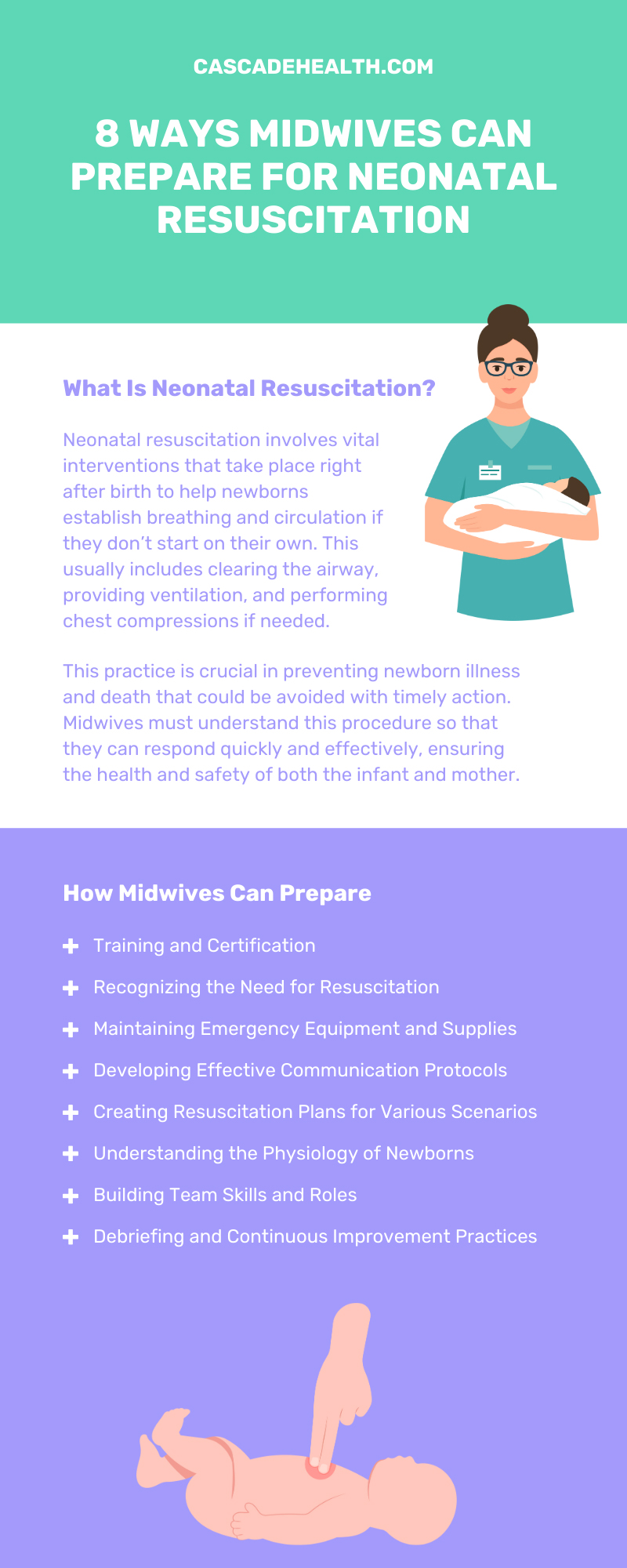8 Ways Midwives Can Prepare for Neonatal Resuscitation
Neonatal resuscitation is a critical skill for midwives to master, as it can mean the difference between life and death for newborns. Responding swiftly and effectively to newborn emergencies is an essential part of midwifery. Explore eight ways midwives can prepare for neonatal resuscitation, ensuring they are ready to act when it matters most.
What Is Neonatal Resuscitation?
Neonatal resuscitation involves vital interventions that take place right after birth to help newborns establish breathing and circulation if they don’t start on their own. This usually includes clearing the airway, providing ventilation, and performing chest compressions if needed.
This practice is crucial in preventing newborn illness and death that could be avoided with timely action. Midwives must understand this procedure so that they can respond quickly and effectively, ensuring the health and safety of both the infant and mother.
How Midwives Can Prepare
Midwives must be thoroughly prepared for neonatal resuscitation, as it is an integral part of their responsibilities. Preparation involves acquiring knowledge, developing practical skills, and maintaining readiness through various means. Below are eight concrete steps midwives can take to ensure they are well-prepared for neonatal resuscitation.
Training and Certification
Continuous education is vital in the medical field, particularly for midwives who need to stay up to date with evolving practices. Midwives should participate in regular training sessions and pursue certifications, such as the Neonatal Resuscitation Program (NRP). These training programs provide updated techniques and protocols, reinforcing each midwife’s ability to perform resuscitation efficiently and effectively.
Hands-on simulations during these sessions are invaluable, as they allow midwives to practice their skills in a controlled and realistic environment. This experiential learning is crucial for boosting their confidence and proficiency, ensuring they can respond swiftly and accurately in real-life situations.
Recognizing the Need for Resuscitation
Being able to quickly identify the signs that a newborn needs resuscitation is crucial for ensuring the infant’s health and safety. Midwives should familiarize themselves with key indicators, such as low Apgar scores, which assess the baby’s appearance, pulse, grimace response, activity, and respiration shortly after birth. Additionally, poor muscle tone can indicate a lack of responsiveness, while abnormal respiratory or heart rates can signal distress or inadequate oxygenation.
Understanding and recognizing these signals enables midwives to initiate resuscitation promptly, minimizing potential complications for the infant and improving overall outcomes. Midwives must maintain up-to-date training and knowledge in neonatal resuscitation techniques to ensure they are prepared to act swiftly in emergencies.
Maintaining Emergency Equipment and Supplies
Having the right tools on-hand is essential in any medical profession, especially for midwives. It is crucial for midwives to regularly check and maintain their emergency equipment, ensuring everything is present and in optimal working order. This includes essential items like suction devices, which are vital for clearing airways; bag-mask ventilators, which are necessary for assisting newborn breathing; and reliable oxygen sources that can provide life-saving assistance when required.
Keeping a well-stocked and organized midwife bag, such as those offered by reputable companies like Cascade Health Care, ensures that essential supplies are always accessible when needed. This level of preparedness enhances the midwife’s ability to respond swiftly in emergencies and provides peace of mind knowing that every tool is ready to aid in delivering quality care.
Developing Effective Communication Protocols
Clear communication can save lives, especially in critical situations. Midwives must establish and practice comprehensive communication protocols with their healthcare teams. These protocols ensure that each team member knows their specific roles and responsibilities during resuscitation, enabling them to work together seamlessly.
By engaging in regular role-playing exercises, team members can better understand and execute their duties, fostering a sense of teamwork and preparedness. Such practices not only enhance the team’s overall effectiveness but also improve patient outcomes by ensuring everyone is on the same page during high-pressure scenarios.
Creating Resuscitation Plans for Various Scenarios
Preparation for resuscitation involves meticulous planning for different scenarios to ensure readiness and effectiveness. Midwives should develop comprehensive resuscitation plans tailored to various potential situations, such as preterm births, deliveries with known complications, or unexpected emergencies.
These plans should outline specific steps and interventions, providing a clear and detailed roadmap during emergencies. This includes identifying necessary equipment, assigning roles to team members, and establishing communication protocols.
Understanding the Physiology of Newborns
A deep understanding of newborn physiology enables midwives to better anticipate and respond to complications during and after birth. This comprehensive knowledge allows them to identify potential issues early and take preventive or corrective measures. For instance, understanding the transition from fetal to neonatal circulation is crucial—this transition involves significant blood flow and oxygenation changes as the newborn begins to breathe independently.
An awareness of these physiological changes can help midwives comprehend the importance of prompt and effective resuscitation, ensuring that oxygen is properly distributed throughout the newborn’s body. Midwives should continually update and expand their knowledge of neonatal physiology through dedicated reading and professional development courses.
Building Team Skills and Roles
Teamwork is crucial during neonatal resuscitation, as the process demands precision and quick, coordinated actions. Midwives and other healthcare professionals should focus on building strong team dynamics to achieve the best outcomes for newborns. This involves ensuring every team member understands their specific role and can perform it effectively under pressure. Regular team training sessions are essential to enhance coordination and cooperation, making sure that everyone is familiar with the latest guidelines and practices.
These sessions improve technical skills and foster communication and trust within the team, ultimately making the resuscitation process more efficient and successful. Healthcare teams can significantly improve the chances of a positive outcome for the infants in their care by dedicating time to developing these skills.
Debriefing and Continuous Improvement Practices
After every resuscitation effort, debriefing with the team involved in the procedure is crucial. This debriefing session provides an opportunity for all team members to come together and discuss what went well during the intervention and identify any areas that may need improvement. This collaborative discussion fosters a culture of continuous learning and encourages open communication among team members. By thoroughly analyzing each case, the team can implement necessary changes, which helps refine existing protocols and practices.
This ongoing process of evaluation and adaptation ensures that midwives and other healthcare professionals consistently improve their skills and preparedness, ultimately enhancing the quality of care provided to patients in need.
Prepare Your Practice With Cascade Health Care
Preparing for neonatal resuscitation is an ongoing process that requires dedication, continuous learning, and teamwork. By understanding how midwives can prepare for neonatal resuscitation, you can enhance your readiness and ensure you are equipped to handle emergencies effectively. For top-notch gear that supports your practice, check out the Iron Duck midwife bags available at Cascade Health Care. Equip yourself with the best tools that allow you to make a lasting difference in the lives of newborns and their families.

Recent Posts
-
Tips for Maintaining Milk Supply When Returning to Work
Returning to work after welcoming a baby introduces logistical, emotional, and physiological challen
-
9 Items EMTs Should Have Stocked for Prehospital Deliveries
Prehospital deliveries rarely announce themselves with perfect timing. One minute you take a routine



